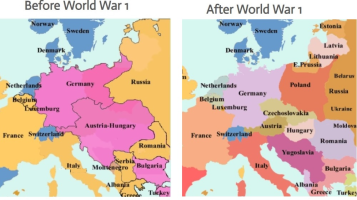Ĝasper
Well-Known Member
With the fall of the German, Russian and Austro-Hungarian empires in WW1, many countries/nations gained independence. Józef Piłsudski wanted to incorporate Poland into into a broader 'Intermarium' federation, seeking to recruit the Baltic states (Lithuania, Latvia, Estonia), Finland, Belarus, Ukraine, Hungary, Romania, Yugoslavia and Czechoslovakia. Nothing ever came of this, and within two decades, all of the countries viewed as candidates had fallen to either Nazi Germany or the Soviet Union. That perhaps vindicated the proposal - united, they may have been harder to conquer, and been represented collectively at international congresses.
With the collapse of the Soviet Union, Comecon and Warsaw Pact - the Visegrad Group was set up in 1991 by Poland, Czechoslovakia and Hungary. They all joined the EU in 2004, and NATO in 1999/2004.

Bulgaria, Romania, Serbia and Greece set up the Craiova Group in 2017. All but Serbia are in the EU and NATO.
There is also the Three Seas Initiative founded 2015, with 12 countries, all NATO and EU, with Ukraine as an additional de-facto member.
It seems likely that these kinds of eastern European alliances will get more and more important. The war in Ukraine can be traced back to Euromaidan in 2013, yet it seems that the EU is basically stringing Ukraine along. NATO won't be taking in any new members states in active conflict. Moldova - home to Transnistria's Russian seperatists - is also left out of both NATO and EU. They applied for EU membership this year. The fact that Romania is in both and Moldova is in neither is a barrier to their unification. Even further east, Georgia, which has followed a similar trajectory to Ukraine, has also been fobbed off / strung along by both the EU and NATO. The European Union all the way to the Caucasus - New Eastern Europe - A bimonthly news magazine dedicated to Central and Eastern European affairs Georgia has work to do before it is considered an EU candidate country - New Eastern Europe - A bimonthly news magazine dedicated to Central and Eastern European affairs Can Georgia’s parliament get the country back on the European track? - New Eastern Europe - A bimonthly news magazine dedicated to Central and Eastern European affairs
There would be internal fears and risks to such a project. The original intermarium idea was perceived by some as aspirations for Polish imperialism. Hungary in particular has imperial ambitions, with large diasporas in neighbouring countries. But they're already in the Visegrad group so this isn't entirely hypothetical. What would be the other pros and cons? Would the west interpret it as buffer states getting too big for their boots? As the possibility for 'proxy war' vanishing, leading simply to the likelihood of all out 'war'?


With the collapse of the Soviet Union, Comecon and Warsaw Pact - the Visegrad Group was set up in 1991 by Poland, Czechoslovakia and Hungary. They all joined the EU in 2004, and NATO in 1999/2004.

Bulgaria, Romania, Serbia and Greece set up the Craiova Group in 2017. All but Serbia are in the EU and NATO.
There is also the Three Seas Initiative founded 2015, with 12 countries, all NATO and EU, with Ukraine as an additional de-facto member.
It seems likely that these kinds of eastern European alliances will get more and more important. The war in Ukraine can be traced back to Euromaidan in 2013, yet it seems that the EU is basically stringing Ukraine along. NATO won't be taking in any new members states in active conflict. Moldova - home to Transnistria's Russian seperatists - is also left out of both NATO and EU. They applied for EU membership this year. The fact that Romania is in both and Moldova is in neither is a barrier to their unification. Even further east, Georgia, which has followed a similar trajectory to Ukraine, has also been fobbed off / strung along by both the EU and NATO. The European Union all the way to the Caucasus - New Eastern Europe - A bimonthly news magazine dedicated to Central and Eastern European affairs Georgia has work to do before it is considered an EU candidate country - New Eastern Europe - A bimonthly news magazine dedicated to Central and Eastern European affairs Can Georgia’s parliament get the country back on the European track? - New Eastern Europe - A bimonthly news magazine dedicated to Central and Eastern European affairs
There would be internal fears and risks to such a project. The original intermarium idea was perceived by some as aspirations for Polish imperialism. Hungary in particular has imperial ambitions, with large diasporas in neighbouring countries. But they're already in the Visegrad group so this isn't entirely hypothetical. What would be the other pros and cons? Would the west interpret it as buffer states getting too big for their boots? As the possibility for 'proxy war' vanishing, leading simply to the likelihood of all out 'war'?


Idris2002
Attachments
Last edited:



